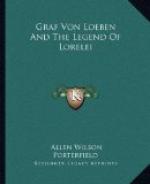Title: Graf von Loeben and the Legend of Lorelei
Author: Allen Wilson Porterfield
Release Date: February 12, 2004 [eBook #11066]
Language: English
Character set encoding: Us-ASCII
***Start of the project gutenberg EBOOK Graf von Loeben and the legend of Lorelei***
Produced by the Project Gutenberg Distributed Proofreaders¥ in the occasion of the birth of Lorelei Kay Lynn Hutchinson.
The images were generously made available by the Bibliotheque
nationale de France (BnF/Gallica) at http://gallica.bnf.fr/s
cripts/ConsultationTout.exe?O=N061319
Modern Philology
Volume XIII October 1915 number 6 (pp. 65-92)
ALLEN WILSON PORTERFIELD
GRAF VON LOEBEN AND THE LEGEND OF LORELEI
I
The devotees of Apollo have to give a good account of themselves in Olympia before, they can become persona grata on Olympus. They spend their lives, more or less, at the various games of poetry. Some, like Goethe, win in the majority of trials, and then we study all of their records regardless of their individual excellence. Some like Immermann in Oberhof, win only once, but this is sufficient to insure immortality. Some play and joust, run and wrestle with constancy and grace; their records, just after starting and just before finishing, are interesting, but in the end they are always defeated. And when this is the case, posterity, lay and initiated, forgets their names and concerns itself in no wise with their records, unless it be for statistical purposes. It is to the latter class that Graf von Loeben[1] belongs. For twenty-five years he was a perpetual, loyal, chivalric contestant in the Olympic vale of poetry. His running was interesting, but he never won; he never wrote a single thing that everybody still reads for its own sake.
Aside from his connection with the Lorelei-matter, Graf von Loeben is, therefore, at present, a wholly obscure, indeed unknown, Poet. The large Konversations-Lexikons[2] of Meyer and Brockhaus say nothing about him, unless it be in the discussion of some other poet with whom he associated. Of the twenty best-known histories of German literature, some of which treat nothing but the nineteenth century, only six contain his name, and these simply mention him either as a member of the Dresden group of pseudo-romanticists, or as one of those Afterromantiker who did yeoman service by way of bringing real romanticism into disrepute through their unsubstantial, imitative, and formless works. And this is true despite the fact that Loeben was an exceedingly prolific writer and a very popular and influential man in. his day. Concerning his personality, Muncker says: “Die Tiefe und WAerme seines leicht erregbaren GemUethes, seine Herzensreinheit, seine schwAermerische Hingabe an alles SchOene und Edle sowie sein zartes TactgefUehl erwarben ihm bei Freunden und Bekannten das Lob einer schOenen Seele in des Wortes schOenster Bedeutung."[3]




